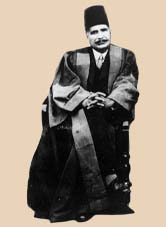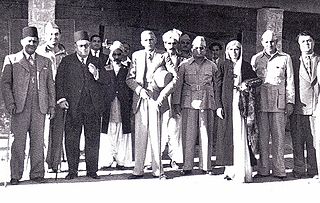
The Pakistani philosophy is the philosophical activity or the philosophical academic output both within Pakistan and abroad. It encompasses the history of philosophy in the state of Pakistan, and its relations with nature, science, logic, culture, religion, and politics since its establishment on August 1947.
Muhammad Hasan Askari (1919 – 18 January 1978) was a Pakistani scholar, literary critic, writer and linguist of modern Urdu language. Initially "Westernized", he translated western literary, philosophical and metaphysical work into Urdu, notably classics of American, English, French and Russian literature. But in his later years, through personal experiences, geopolitical changes and the influence of authors like René Guénon, and traditional scholars of India towards more latter part of his life, like Maulana Ashraf Ali Thanwi, he became a notable critic of the West and proponent of Islamic culture and ideology.
Muhammad Munawar Mirza, was a prominent Iqbal scholar, historian, writer and intellectual from Pakistan.
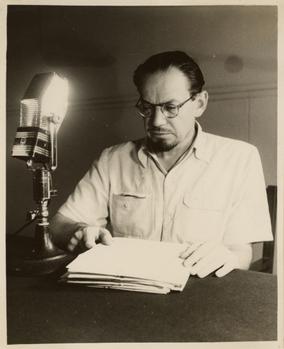
Muhammad Asad, was an Austro-Hungarian-born Jew and revert to Islam who worked as a journalist, traveler, writer, linguist, political theorist, diplomat.

Ghulam Mustafa Tabassum, was a 20th-century poet. His pen name was Tabassum.
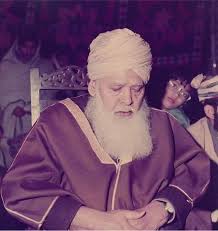
Syed Ahmad Saeed Kazmi was a Pakistani Islamic scholar and Sufiwho belonged to the Barelvi movement of Sunni Islam. He migrated to Multan in 1935 from Amroha. He is known for his contribution to the Pakistan Movement, Urdu translation and Tafseer of Quran, and Dars-e-Hadith. His tomb sits next to Multan's 18th century Shahi Eid Gah Mosque.
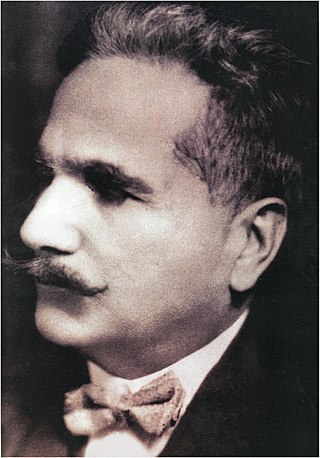
Sir Muhammad Iqbal was an Indian Muslim philosopher, author, and politician. His poetry in the Urdu language is considered to be among the greatest of the 20th century, and his vision of a cultural and political ideal for the Muslims of British-ruled India is widely regarded as having animated the impulse for the Pakistan Movement. He is commonly referred to by the honourific Allama.
Raja Hassan Akhtar; was a political worker in the Pakistan Muslim League prior to the independence of Pakistan in 1947. After independence, he was a Member Pakistan National Assembly (MNA), President, West Pakistan Muslim League, Vice President, All Pakistan Muslim League, and Tehrik–e–Pakistan Gold Medalist
Prof. Yousaf Saleem Chishti, known as Yusuf Salim Chishti, was a Pakistani eminent scholar and writer. He was the interpreter and commentator of Allama Mohammed Iqbal's work and worked with him from 1925 to 1938 predominantly.
Ghulam Rasool Mehr was a Pakistani Muslim scholar and political activist born in Phoolpur, a village in the district of Jalandhar, British India.

Iqbal Academy Pakistan(Urdu:اقبال اکادمی پاکستان) is an institute whose purpose is to study, promote, and disseminate the teachings of the poet and philosopher Allama Muhammad Iqbal. It was established by the Government of Pakistan, through the Iqbal Academy Ordinance No. XXVI of 1962.
Saeed Ahmad Akbarabadi was an Indian Islamic scholar and an Urdu-language author who co-founded the Nadwatul Musannifeen. He served as the dean of the Faculty of Theology in Aligarh Muslim University.
Shahid Ahmad Dehlvi was a Pakistani author, editor and translator. He was conferred with the Pride of Performance award for his literary services by the Government of Pakistan in 1963. He was the grandson of Urdu novel writer and religious reformer Nazir Ahmad Dehlvi.

This page list topics related to Muhammad Iqbal.
Khalifa Abdul Hakeem was a Pakistani philosopher, poet, critic, researcher, philologist, translator, and former professor of philosophy at Osmania University. He was the former director of Islamic Culture Institute, Lahore.
Hakeem Muhammad Musa Amritsari also known as Hakeem-e-Ahle Sunnat was an Indian–Pakistani Sufi saint of Chishti and Qadiriyya order and an Islamic scholar, belonging to the Barelvi movement of Sunni Islam. He was the Khalifa of Ziauddin Madani, a student of Ahmed Raza Khan Barelvi, the founder of Barelvi movement. He was the editor of Mehr wa Maah, Lahore, founder and president of Markazi Majlis Raza, Lahore.
